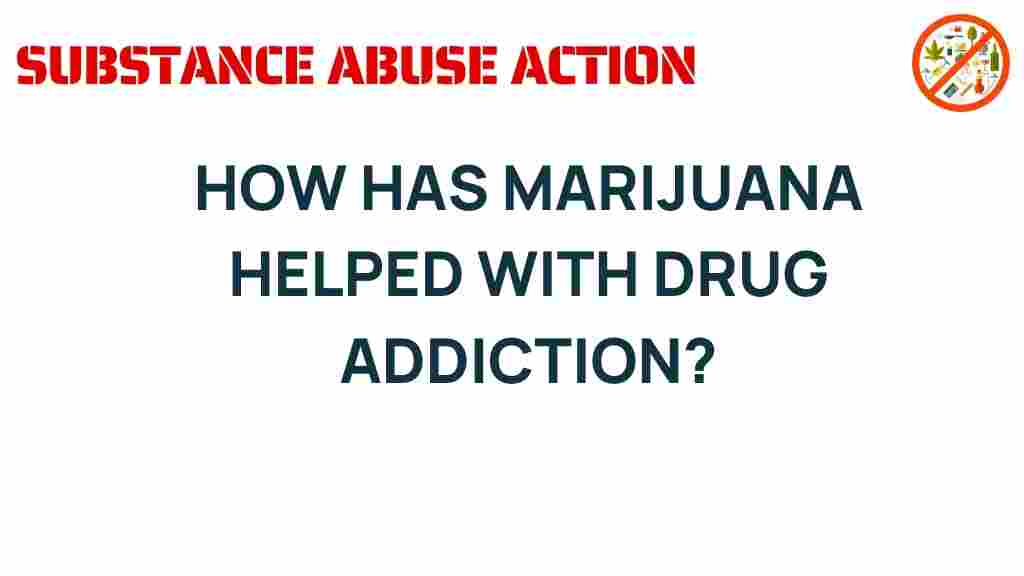Unraveling the Paradox: Can Marijuana Aid in Overcoming Drug Addiction?
In recent years, the conversation surrounding marijuana has shifted dramatically, particularly in its potential role in treating drug addiction. As more states legalize cannabis for both recreational and therapeutic use, many are left wondering: can marijuana be a beneficial tool in the battle against drug addiction? This article seeks to explore this paradox, diving into how marijuana may aid in recovery, the implications for mental health, and the role of addiction support in rehabilitation.
Understanding Drug Addiction
Before we delve into the complexities of marijuana and its potential benefits, it’s crucial to understand what drug addiction entails. Drug addiction, or substance use disorder (SUD), is a chronic condition characterized by an individual’s inability to control their drug use despite harmful consequences. Common symptoms include:
- Loss of control over drug use
- Cravings for the substance
- Tolerance to the effects of the drug
- Withdrawal symptoms when not using the drug
Drug addiction can severely impact mental health, leading to conditions like anxiety and depression, which can further complicate recovery efforts. Traditional treatment methods often include therapy, support groups, and medication-assisted treatment (MAT). However, many individuals are seeking alternative therapies, raising the question of marijuana’s potential role in recovery.
The Therapeutic Use of Marijuana
Marijuana, particularly its active compounds known as cannabinoids (like THC and CBD), has been recognized for its therapeutic properties. Research suggests that marijuana may help manage several conditions relevant to addiction recovery:
- Chronic Pain Management: Many individuals turn to drugs for pain relief. Marijuana can serve as a natural alternative, reducing reliance on opioids.
- Anxiety and Depression Relief: Cannabis may help alleviate symptoms of anxiety and depression that often accompany drug withdrawal.
- Minimizing Cravings: Some studies indicate that cannabinoids can reduce drug cravings, making it easier for individuals to resist temptation.
This therapeutic use positions marijuana as a potential ally in the recovery process, particularly for individuals struggling with poly-substance use or those who have not found success with traditional treatments.
Marijuana and Mental Health
The intersection of marijuana, addiction, and mental health is complex. While some individuals may find relief from mental health issues through cannabis use, others may experience adverse effects. Here are key considerations:
- Individual Reactions: Each person’s reaction to marijuana can vary widely. For some, it may provide relief; for others, it may exacerbate anxiety or lead to increased dependency.
- Strain Differences: Different strains of cannabis contain varying levels of THC and CBD, which can affect their impact on mental health. CBD-dominant strains may offer therapeutic benefits without the psychoactive effects of THC.
- Long-Term Effects: The long-term effects of consistent marijuana use, particularly in adolescents and young adults, are still being studied, and it is essential to approach with caution.
The Role of Rehabilitation and Addiction Support
Rehabilitation programs are crucial in the journey towards recovery from drug addiction. These programs often include various forms of therapy and support systems. Integrating marijuana into these programs may offer additional benefits, but it must be approached thoughtfully. Here are steps to consider:
- Consultation: Individuals should consult with addiction specialists to discuss the potential use of marijuana within their treatment plan.
- Monitoring: If marijuana is incorporated, it should be closely monitored to assess its effects on the individual’s recovery journey.
- Support Groups: Engaging with support groups that are open to discussing the therapeutic use of cannabis can provide valuable insights and community support.
Integrating marijuana into rehabilitation programs should not replace traditional therapies but rather complement them, providing a holistic approach to treatment.
Step-by-Step Process for Incorporating Marijuana in Recovery
If you’re considering the therapeutic use of marijuana in your recovery journey, follow these steps:
- Research: Educate yourself about the different strains of marijuana and their effects. Understanding the differences between THC and CBD can help you make informed choices.
- Consult a Professional: Speak with a healthcare provider or addiction specialist who understands cannabis and can guide you based on your specific situation.
- Choose the Right Strain: Based on your needs, opt for a strain that may help alleviate symptoms without leading to increased dependency.
- Set Clear Goals: Define what you hope to achieve with cannabis use in your recovery process. This could include reducing cravings, managing anxiety, or alleviating pain.
- Monitor Your Progress: Keep track of your mental and physical health as you incorporate marijuana into your treatment. Adjust your approach as needed based on your responses.
Troubleshooting Tips
As you navigate the use of marijuana in your recovery, you may encounter challenges. Here are some troubleshooting tips:
- Increased Cravings: If you find your cravings intensifying with marijuana use, consult your healthcare provider to reassess your approach.
- Negative Mental Health Effects: If you experience heightened anxiety or paranoia, consider switching strains or reducing dosage. Not all marijuana will have the same effects.
- Dependency Concerns: If you feel that you are becoming dependent on marijuana, it may be time to reevaluate its role in your recovery.
Conclusion
The debate over marijuana’s role in overcoming drug addiction continues to evolve. While marijuana may offer therapeutic benefits for some individuals in recovery, it is essential to approach its use cautiously and mindfully. Collaboration with healthcare professionals, ongoing monitoring, and support systems are vital to ensure that marijuana contributes positively to the recovery journey.
As society continues to explore the potential of cannabis in addiction treatment, further research is necessary to fully understand its implications for mental health and recovery. If you or someone you know is struggling with drug addiction, consider seeking professional help and exploring all available treatment options, including the potential therapeutic use of marijuana. For more information on addiction support resources, visit AddictionSupport.org.
By unraveling the paradox of marijuana’s role in overcoming drug addiction, we can pave the way for innovative approaches to treatment and recovery that prioritize individual needs and holistic healing.
This article is in the category Treatment and created by SubstanceAbuseAction Team
